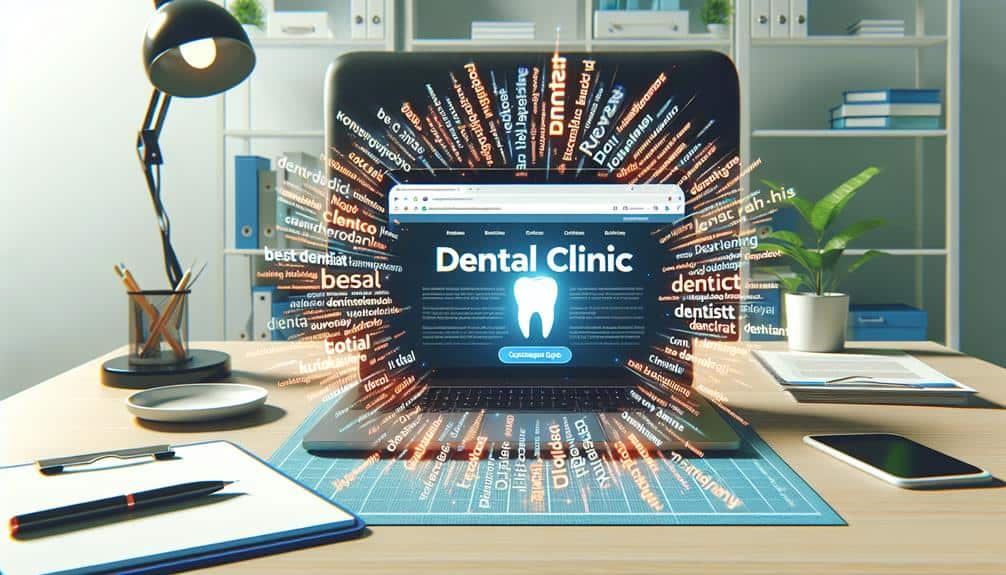So you think you’ve got the whole SEO game figured out, huh? Well, let me tell you, my friend, there’s a secret weapon that many dentists are using to skyrocket their online visibility – local keywords.
If you’re a dentist looking to dominate the search engine results page, then you need to pay attention. By strategically incorporating local keywords into your website content, metadata, and alt tags, you can not only boost your SEO but also attract more local patients to your practice.
But how exactly do you do that? Well, stick around, because we’re about to reveal the secrets of using local keywords to your advantage.
Key Takeaways
- Local keywords are crucial for dentists’ SEO strategies as they attract potential patients in the area and increase visibility in local search results.
- Conducting local keyword research using tools like Google Keyword Planner and SEMrush helps identify relevant keywords with high search volume and low competitiveness.
- Optimizing website content with local keywords, including in titles, headings, and metadata, enhances online presence and search engine visibility.
- Tracking and analyzing local keyword performance is essential for measuring the effectiveness of the local SEO strategy and identifying areas for improvement.
Importance of Local Keywords for Dentists
Local keywords play a crucial role in the success of dentists’ search engine optimization (SEO) strategies. As a dentist, understanding the importance of targeting local patients can greatly benefit your practice. By incorporating local keywords into your website content, you can effectively attract potential patients in your area who are actively searching for dental services.
One of the key benefits of targeting local patients is the increased visibility your practice will gain in local search results. When someone in your area searches for a dentist, using local keywords can help your website appear higher in their search results, increasing the likelihood of them choosing your practice. This can lead to a higher conversion rate of website visitors to actual patients.
Another strategy for incorporating local keywords is through social media campaigns. When creating content for your social media platforms, it’s important to use local keywords in your posts, captions, and hashtags. This will help your content reach a wider audience in your area, increasing the chances of attracting local patients to your practice.
How to Conduct Local Keyword Research
To effectively optimize your website for local search results, it’s essential to understand the process of conducting local keyword research. Local keyword research tools play a crucial role in helping dentists identify the most relevant and effective keywords to target in their local SEO efforts.
These tools, such as Google Keyword Planner, Moz Keyword Explorer, and SEMrush, provide valuable insights into the search volume, competition, and potential ranking opportunities for specific keywords in your local area.
When conducting local keyword research, start by brainstorming a list of keywords that are relevant to your dental practice and location. Think about the services you offer, the specific treatments you specialize in, and the areas you serve. Once you have a list of potential keywords, use local keyword research tools to analyze their search volume and competitiveness. This will help you prioritize which keywords to target.
Incorporating local keywords in your blog posts is another effective strategy to boost your website’s SEO. By creating informative and educational content that includes relevant local keywords, you can attract more organic traffic from people searching for dental services in your area. Remember to optimize your blog posts by including the local keywords naturally in the title, headings, and throughout the content.
Optimizing Website Content With Local Keywords
Are you ready to take your dental practice to the top of local search results? Optimizing your website content with local keywords is a highly effective strategy for boosting your SEO and attracting more local patients.
By incorporating local keywords strategically throughout your website, you can increase your visibility in local search results and drive more targeted traffic to your practice.
One effective strategy for incorporating local keywords is to create location-specific landing pages on your website. These pages can focus on specific services or treatments that you offer in different areas, and can include local keywords in the page titles, headings, and content. For example, a dentist in New York City could create a landing page titled ‘Cosmetic Dentistry in NYC’ and include keywords such as ‘best cosmetic dentist in NYC’ or ‘cosmetic dentistry services in New York City’ throughout the page.
Another strategy is to include local keywords in your website’s meta tags, such as the meta title and meta description. This will help search engines understand the geographical relevance of your website and improve your chances of appearing in local search results.
To further illustrate the effectiveness of incorporating local keywords, case studies on successful use by dentists in boosting SEO can be examined. These case studies show how dentists have implemented local keywords in their website content and achieved higher rankings in local search results. By analyzing these case studies, you can gain valuable insights and learn from their strategies to optimize your own website content.
Leveraging Local Keywords in Metadata and Alt Tags
Utilizing local keywords in metadata and alt tags is a strategic approach to enhance your dental practice’s online presence and improve its visibility in local search results. When it comes to optimizing your website for local SEO, every element counts, including metadata and alt tags. These components provide valuable information to search engines about the content and relevance of your web pages. By incorporating local keywords in your metadata, such as title tags and meta descriptions, you can optimize your website to appear in relevant local search queries.
Additionally, alt tags play a crucial role in improving your website’s accessibility and search engine visibility. Alt tags are used to describe the content of images on your website, allowing search engines to understand what the image represents. By including local keywords in alt tags, you can further optimize your website for local search queries and increase the chances of appearing in search results.
Furthermore, using local keywords in your URL structure and anchor text can also enhance your website’s visibility. When creating URLs for your web pages, include relevant local keywords to make them more descriptive and SEO-friendly. Similarly, when linking to other pages within your website, use anchor text that includes local keywords to provide additional context and relevance.
Incorporating local keywords in blog post titles and headers is another effective way to boost your dental practice’s online presence. When creating blog posts, ensure that the titles and headers contain relevant local keywords to attract local search traffic. This helps search engines understand the geographical relevance of your content and improves your chances of appearing in local search results.
Tracking and Analyzing Local Keyword Performance
Tracking and analyzing the performance of local keywords is essential for optimizing your dental practice’s online presence and ensuring the effectiveness of your local SEO strategy. Measuring the effectiveness of local keywords allows you to understand how well your website is ranking for specific keywords in your local area. By monitoring and analyzing this data, you can identify areas for improvement and implement strategies for improving local keyword rankings.
One effective way to track and analyze local keyword performance is by using a keyword tracking tool. These tools provide insights into keyword rankings, search volume, and competition. By regularly monitoring your keyword rankings, you can see which keywords are performing well and which ones may need improvement. This information can help you make informed decisions about your SEO strategy and focus your efforts on the keywords that are most relevant and valuable to your dental practice.
To help you understand the importance of tracking and analyzing local keyword performance, here is a table highlighting the key benefits:
| Benefits of Tracking and Analyzing Local Keyword Performance |
| 1. Identify top-performing keywords |
| 2. Discover new keyword opportunities |
| 3. Measure the impact of SEO efforts |
Frequently Asked Questions
What Are Some Common Mistakes to Avoid When Using Local Keywords for Dental SEO?
To avoid common mistakes when using local keywords for dental SEO, make sure to avoid keyword stuffing, use relevant and specific keywords, and optimize your website content for local search. Effective strategies include incorporating local keywords naturally into your website content.
Can Dentists Use Local Keywords to Target Specific Neighborhoods or Regions?
You can definitely use local keywords to target specific neighborhoods or regions. By incorporating keywords like “dentist in [neighborhood/region],” you can attract potential patients in those areas and increase your visibility in local searches.
How Can Dentists Ensure That Their Website Is Optimized for Local Search Results?
To optimize your dental website for local search results, make sure to include relevant local keywords throughout your content. Additionally, it’s important to list your practice on local directories, as they can significantly boost your dental SEO.
Are There Any Specific Guidelines or Best Practices for Using Local Keywords in Website Content?
To boost your SEO, make sure to conduct local keyword research and optimize your website content accordingly. By following specific guidelines and best practices, you can strategically incorporate local keywords into your website to improve your ranking in local search results.
What Tools or Resources Can Dentists Use to Track the Performance of Their Local Keywords in Search Rankings?
You can easily track the performance of your local keywords in search rankings with keyword tracking tools designed for dentists. These tools provide valuable performance metrics to help you optimize your dental SEO.
Conclusion
In conclusion, by strategically incorporating local keywords into their website content, dentists can significantly boost their SEO and attract more local patients.
Conducting thorough keyword research and optimizing metadata and alt tags are crucial steps in this process.
By tracking and analyzing the performance of these keywords, dentists can continuously refine their SEO strategy and ensure long-term success in attracting the right audience.
Embrace the power of local keywords and watch your dental practice thrive in the digital world.

Suraj Rana is a renowned Dental SEO Expert, deeply committed to elevating dental practices in the online landscape. With a profound understanding of technical SEO, he specializes in tailoring on-page optimization strategies specifically for the dental industry. Suraj’s extensive experience spans across various sectors, but his passion truly lies in transforming the digital presence of dental clinics. His expertise in dental-specific search engine optimization, combined with a data-driven approach, empowers him to develop strategies that significantly increase organic traffic, enhance search engine rankings for dental-related keywords, and ultimately drive business growth for his dental clients. Suraj Rana’s unique blend of SEO skills and dedication to the dental field make him an invaluable asset to any dental practice looking to thrive online.


